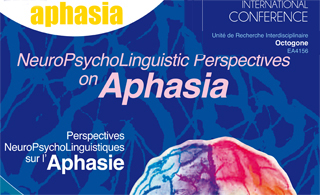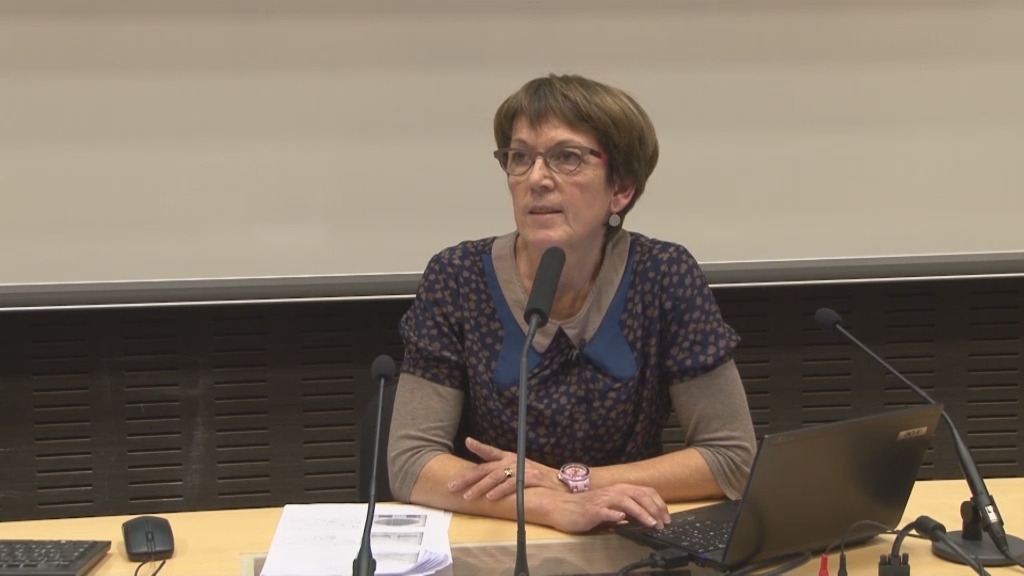Notice
Communication profiles and executive impairments following right-hemisphere stroke: a crosscultural perspective / Perrine Ferré
- document 1 document 2 document 3
- niveau 1 niveau 2 niveau 3
Descriptif
Communication profiles and executive impairments following right-hemisphere stroke: a crosscultural perspective / Perrine Ferré. In "Perspectives neuropsycholinguistiques sur l'aphasie - NeuroPsychoLinguistic Perspectives on Aphasia", colloque international organisé par l'Unité de Recherche Interdisciplinaire Octogone de l'Université Toulouse II-Le Mirail (France). Toulouse, 21-23 juin 2012.
It is now accepted among thescientific and clinical community that a right-hemisphere-stroke maylead to communication disorders. Former studies estimate that atleast 50% of right hemisphere damaged individuals have prosodic,discourse, pragmatics and/or lexico-semantic disorders. These aspectsof communication have been described in isolation in the literature,but only a few studies have been devoted to the fact that they mightco-exist in a same individual. Even fewer studies have been based ona crosscultural perspective. Executive impairments and othercognitive processes have been suspected to underlie communicationdeficits, suggesting that communication deficits are notlanguage-specific, but no study at large scale is available toconfirm this hypothesis.
Like the portraits of aphasiaassociated with left brain injury, describing patterns ofcommunication following a right brain damage will help properidentification and clinical intervention in speech and languagetherapy. This research aimed at classifying communication profilesamong right-brain-damaged adults with an intercultural perspectiveand with regards to other cognitive processes.
The sample is made up of 154right-brain-damaged individuals from four nationalities (Canadians,Brazilians, Italians and Argentineans). They were assessed using 13language tasks from the Protocol MEC and a neuropsychological batteryaddressing executive processing and attention.
A hierarchical cluster analysisrevealed four distinct clinical profiles of communication: 1-extensive impairments in all components; 2-mixed impairments ofsemantic, prosodic and discursive fields; 3-exclusive conversationimpairment and 4- mild or no impairment.
Since only few distinctions betweennationalities were to be observed, the results suggest that thereprobably is a universality of clinical profiles after a right braindamage. Exploration of executive impairment indicates that deficitsin inhibition, cognitive flexibility and attention mayexacerbate the severity and extent of deficits in allcomponents of communication. Nonetheless, there is no linearassociation between profiles of communication and executiveimpairments. Furthermore, clear dissociations at theindividual level are observable.
This study proposes a specifictaxonomy of communication disorders among right-brain-damagedindividuals in a crosscultural and cognitive perspective. It mightcontribute to a better detection of communication disorders and tothe development of a more accurate clinical intervention for adultssuffering from consequences of a right hemisphere stroke.
Intervention / Responsable scientifique
Thème
Documentation
Bibliographie sélective
Giussani, C., Roux, F-E., Lubrano, V., Gaini, S. M., Bello, L. (2007). Review of language organisation in bilingual patients: what can we learn from direct brain mapping?, Acta Neurochirurgica, 149 (11), 1109–1116.
Indefrey, P. (2006). A Meta-analysis of hemodynamic studies on first and second language processing: Which suggested differences can we trust and what do they mean? Language Learning, 56, 279–304.
Lucas, T. H., McKhann, G. M., Ojemann, G. A. (2004). Functional separation of languages in the bilingual brain: a comparison of electrical stimulation language mapping in 25 bilingual patients and 117 monolingual control patients. Journal of Neurosurgery, 101, 449–457.
Ojemann, G., Ojemann, J., Lettich, E., Berger, M. (1989). Cortical language localization in left, dominant hemisphere: an electrical stimulation mapping investigation in 117 patients. Journal of Neurosurgery, 71, 316–326
Paradis, M., Libben, G. (1987). The Bilingual Aphasia Test. Hillsdale, NJ: Lawrence Earlbaum Associates.
Sanai, N., Mizadeh, Z., & Berger, M. S. (2008). Functional outcome after language mapping for glioma resection. The New England Journal of Medecine, 358, 18–27.
Szekely, A., et al. (2005). Timed action and object naming. Cortex, 41 (1), 7–26.
> Voir aussi la bibliographie générale à télécharger dans l'onglet "Documents" de la séquence vidéo d'ouverture du colloque.
Dans la même collection
-
Phonological and phonetic encoding and impairment / Marina Laganaro
LaganaroMarinaPhonological and phonetic encoding and impairment / Marina Laganaro
-
Perspectives neuropsycholinguistiques sur l'aphasie - NeuroPsychoLinguistic Perspectives on Aphasia…
Perspectives neuropsycholinguistiques sur l'aphasie - NeuroPsychoLinguistic Perspectives on Aphasia : ouverture. Colloque international organisé par l'Unité de Recherche Interdisciplinaire Octogone de
-
A « subtle phonetic deficit » in fluent aphasia ? An acoustic and perceptual study / Anna Marczyck
MarczyckAnnaA « subtle phonetic deficit » in fluent aphasia ? An acoustic and perceptual study / Anna Marczyck
-
Entre dysfonctionnement et normalité : une perspective à partir de données anatomo‐fonctionnelles o…
DuboisCyril Michel RobertLahyaniSaoussanEntre dysfonctionnement et normalité : une perspective à partir de données anatomo‐fonctionnelles obtenues auprès de sujets sains et de sujets aphasiques / Saoussan Lahyani, Cyril Dubois. In
-
Pour une approche dynamique des réponses aphasiques obtenues en dénomination d’images : apport de l…
TranThi MaiPour une approche dynamique des réponses aphasiques obtenues en dénomination d’images : apport de l’analyse qualitative / Thi-Mai Tran, in "Perspectives neuropsycholinguistiques sur l'aphasie -
-
Compounding and lexical recursion in aphasia and in Alzheimer’s disease / Zoltán Bánréti
BánrétiZoltánCompounding and lexical recursion in aphasia and in Alzheimer’s disease / Zoltán Bánréti. In "Perspectives neuropsycholinguistiques sur l'aphasie - NeuroPsychoLinguistic Perspectives on Aphasia",
-
Age of acquisition affects word retrieval in spontaneous speech produced by patients with Alzheimer…
GayraudFrédériqueBarkatMélissaAge of acquisition affects word retrieval in spontaneous speech produced by patients with Alzheimer's disease / Frédérique Gayraud, Mélissa Barkat-Defradas. In "Perspectives neuropsycholinguistiques
-
Morpho-syntactic processing of regular and irregular formations in Arabic aphasia / Tariq Khwaileh
KhwailehTariqMorpho-syntactic processing of regular and irregular formations in Arabic aphasia / Tariq Khwaileh. In "Perspectives neuropsycholinguistiques sur l'aphasie - NeuroPsychoLinguistic Perspectives on
-
German Broca’s and Wernicke’s aphasics display similar deficits in syntactic performance / Eva Wimm…
WimmerEvaGerman Broca’s and Wernicke’s aphasics display similar deficits in syntactic performance / Eva Wimmer. In "Perspectives neuropsycholinguistiques sur l'aphasie - NeuroPsychoLinguistic Perspectives on
-
Violating canonicity in Spanish agrammatism / Silvia Martínez-Ferreiro
Martinez-FerreiroSilviaViolating canonicity in Spanish agrammatism / Silvia Martínez-Ferreiro. In "Perspectives neuropsycholinguistiques sur l'aphasie - NeuroPsychoLinguistic Perspectives on Aphasia", colloque international
-
Sentence comprehension deficits in aphasia : additional insights from impairment-specific assessmen…
HanneSandraSentence comprehension deficits in aphasia : additional insights from impairment-specific assessment / Sandra Hanne.
-
Principles of bilingual aphasia assessment and interpretation of findings / Michel Paradis
ParadisMichelPrinciples of bilingual aphasia assessment and interpretation of findings / Michel Paradis. In "Perspectives neuropsycholinguistiques sur l'aphasie - NeuroPsychoLinguistic Perspectives on Aphasia",
Sur le même thème
-
"Déficit phonético-phonologique dans l’aphasie vasculaire : Réflexion sur le rôle des structures sy…
Les locuteurs ayant subi un AVC entrainant une aphasie avec deficit (phonetico-)phonologique realisent, en production orale, des paraphasies qui alterent soit la structure syllabique de leur langue
-
06 - Troubles lexico-sémantiques dans l’aphasie : évolution des interprétations (Crisco)
Journée d’étude : "Cerveau et Langage"
-
Perspectives neuropsycholinguistiques sur l'aphasie - NeuroPsychoLinguistic Perspectives on Aphasia…
Perspectives neuropsycholinguistiques sur l'aphasie - NeuroPsychoLinguistic Perspectives on Aphasia : ouverture. Colloque international organisé par l'Unité de Recherche Interdisciplinaire Octogone de
-
Phonological and phonetic encoding and impairment / Marina Laganaro
LaganaroMarinaPhonological and phonetic encoding and impairment / Marina Laganaro
-
Entre dysfonctionnement et normalité : une perspective à partir de données anatomo‐fonctionnelles o…
DuboisCyril Michel RobertLahyaniSaoussanEntre dysfonctionnement et normalité : une perspective à partir de données anatomo‐fonctionnelles obtenues auprès de sujets sains et de sujets aphasiques / Saoussan Lahyani, Cyril Dubois. In
-
A « subtle phonetic deficit » in fluent aphasia ? An acoustic and perceptual study / Anna Marczyck
MarczyckAnnaA « subtle phonetic deficit » in fluent aphasia ? An acoustic and perceptual study / Anna Marczyck
-
Pour une approche dynamique des réponses aphasiques obtenues en dénomination d’images : apport de l…
TranThi MaiPour une approche dynamique des réponses aphasiques obtenues en dénomination d’images : apport de l’analyse qualitative / Thi-Mai Tran, in "Perspectives neuropsycholinguistiques sur l'aphasie -
-
Age of acquisition affects word retrieval in spontaneous speech produced by patients with Alzheimer…
GayraudFrédériqueBarkatMélissaAge of acquisition affects word retrieval in spontaneous speech produced by patients with Alzheimer's disease / Frédérique Gayraud, Mélissa Barkat-Defradas. In "Perspectives neuropsycholinguistiques
-
Compounding and lexical recursion in aphasia and in Alzheimer’s disease / Zoltán Bánréti
BánrétiZoltánCompounding and lexical recursion in aphasia and in Alzheimer’s disease / Zoltán Bánréti. In "Perspectives neuropsycholinguistiques sur l'aphasie - NeuroPsychoLinguistic Perspectives on Aphasia",
-
Violating canonicity in Spanish agrammatism / Silvia Martínez-Ferreiro
Martinez-FerreiroSilviaViolating canonicity in Spanish agrammatism / Silvia Martínez-Ferreiro. In "Perspectives neuropsycholinguistiques sur l'aphasie - NeuroPsychoLinguistic Perspectives on Aphasia", colloque international
-
Sentence comprehension deficits in aphasia : additional insights from impairment-specific assessmen…
HanneSandraSentence comprehension deficits in aphasia : additional insights from impairment-specific assessment / Sandra Hanne.
-
Principles of bilingual aphasia assessment and interpretation of findings / Michel Paradis
ParadisMichelPrinciples of bilingual aphasia assessment and interpretation of findings / Michel Paradis. In "Perspectives neuropsycholinguistiques sur l'aphasie - NeuroPsychoLinguistic Perspectives on Aphasia",















